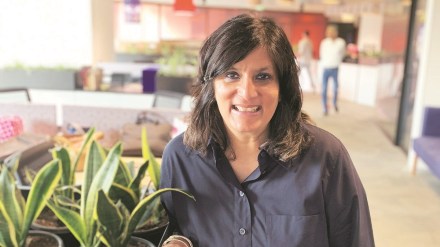“Meaningful creativity and commercial success have a symbiotic relationship,” says Devika Seth Bulchandani, who took over as global chief executive officer of the advertising and public relations agency group Ogilvy last month. In an interview with Anushree Bhattacharyya, the Indian-born Bulchandani talks about ways to balance creativity and profitability and the role advertising can play to bring about change in society. Excerpts:
Ogilvy’s stated policy is borderless creativity. How does an advertising network maintain the balance between creating a profitable business and creativity?
The two need not fight each other. At the end of the day, there is no denying that we are a for-profit business and answerable to WPP which is also answerable to its shareholders. As a consultation business what matters is we should be able to provide value to businesses, which we are able to. Hence, both can co-exist.
Will it be fair to say that the role of digital in advertising is limited to conversion and the number of clicks as opposed to campaigns designed to create an impact in the lives of people?
Just like in our meals, we require salt, spice, and sugar, a brand in this modern world requires different elements to drive its goals. It would be incorrect to say that we don’t need conversion. But the way we should look at it is how we can create a short-term business impact while building long-term equity for brands.
You have addressed the issue of diversity and inclusivity through your creative work. What exactly is the challenge and opportunity for advertising in this area?
The day we, as a society, are able to provide equal opportunity irrespective of gender, race, or sexual preferences, that day we will be truly diverse. But that’s easier said than done. All of us have different backgrounds, especially in education. Within this, women, when compared with men, get even less opportunity. Hence, we all must use our respective platforms to raise awareness. Add to that, prejudice is tangible and often is a hurdle. In my life, three white men made a big difference. First it was Harris Diamond, the former CEO of McCann Worldgroup, who six years back moved me out of strategy; then Rob Riley, former global creative chairman of McCann, and now Mark Reed, CEO, of WPP, who gave me the platform. I have a voice and now I need to use my platform to create an impact across boundaries. At the end of the day, and I quote Maya Angelou, “I’ve learned that people will forget what you said, people will forget what you did, but people will never forget how you made them feel”.
Consumers today want their brands to take up social causes and advertising to become an agent of change. Do you think that expectation is justified?
In advertising, we have the ability to use human imagination and amplify solutions that businesses have created to bring about a change in society in general and in small businesses in particular. Mondelez’s campaign for its chocolate brand Cadbury which supported local retailers last Diwali is a classic example of how businesses can bring about societal changes. Our job is to amplify that and ensure that it has a real impact. In this modern world, businesses have a responsibility to work towards bringing about societal changes.
How did your growing-up years in India shape your outlook as a creative change agent?
While growing up I was told that I couldn’t do certain things. Girls don’t do those things. For example, girls don’t jump off the roof. Today I have about six scars on my face; this is proof of what girls can do because I jumped from the roof. We used to live in a joint family, and I remember I came running one day and told my uncles, ‘I did it’.
I always craved independence. As I grew up, I knew that I didn’t want an office job and ended up in advertising accidentally. Needless to say, it has been the happiest accident. It is all about people and I love this business.
